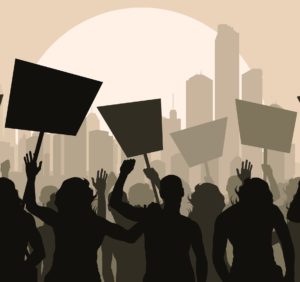
Over the weekend we witnessed more than a million protesters across the country peacefully voice their concerns over the current social and political climate in America. Hundreds of thousands of women flocked to Washington D.C. to have their voices heard, and roughly 100,000 people participated in a demonstration here in St. Paul. Reports suggest that these were very peaceful protests, but if lawmakers get their way, future protesters may face criminal charges for their actions.
Criminalizing Protests
Republican lawmakers in five states have drafted bills that seek to defer certain types of protests. In Minnesota, the proposed bill seeks to dramatically stiffen fines for any protesters who block freeways or highways, and it would allow prosecutors to seek up to a full year in jail for protesters who obstruct roadways. Here’s a look at the proposals in the four other states:
- In North Dakota, lawmakers introduced a bill that would allow motorists to run over and kill any protester obstructing a highway, so long as the driver does so accidentally.
- In Washington, lawmakers have sought to reclassify protests deemed to cause “economic terrorism” as a felony-level crime.
- In Michigan, Republican lawmakers introduced an anti-picketing law that would increase penalties against protesters and would make it easier for businesses to sue individuals for their actions.
- In Iowa, a Republican lawmaker plans to introduce a bill that would crack down on highway protests.
History In Minnesota
The move to criminalize freeway protesters in Minnesota likely arose out of an incident back in July. In the wake of the Philando Castile shooting, nearly 300 protesters walked onto Interstate 94 and blocked traffic for five hours. Police arrested 46 people that day on charges of rioting, public nuisance and unlawful assembly. All rioting charges were eventually dismissed by a judge, but future protesters could see stiffer penalties if the new legislation is passed. The proposal would upgrade highway obstruction to a gross misdemeanor, which carries a potential penalty of fines up to $3,000 and up to a year in jail.
“You need to obey the laws of the freeway,” said Kathy Lohmer, a Republican from Stillwater. “They are there for a purpose. Freeways are not really public spaces, like parks and places like that. You need a license to drive on the freeway. You can’t walk on the freeway.”
It will be interesting to see how much traction the proposal gets as it makes its way to the House and Senate. The protests across the country showed that people can speak out peacefully, but how will impeding traffic be viewed by lawmakers? We’ll keep an eye on the bill as it moves towards a vote.





